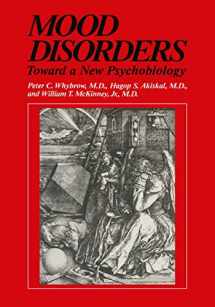
Mood Disorders: Toward a New Psychobiology (Critical Issues in Psychiatry)
ISBN-13:
9781461296928
ISBN-10:
1461296927
Edition:
Softcover reprint of the original 1st ed. 1984
Author:
Hagop S. Akiskal, Peter C. Whybrow, William T. McKinney Jr.
Publication date:
2011
Publisher:
Springer
Format:
Paperback
244 pages
FREE US shipping
Book details
ISBN-13:
9781461296928
ISBN-10:
1461296927
Edition:
Softcover reprint of the original 1st ed. 1984
Author:
Hagop S. Akiskal, Peter C. Whybrow, William T. McKinney Jr.
Publication date:
2011
Publisher:
Springer
Format:
Paperback
244 pages
Summary
Mood Disorders: Toward a New Psychobiology (Critical Issues in Psychiatry) (ISBN-13: 9781461296928 and ISBN-10: 1461296927), written by authors
Hagop S. Akiskal, Peter C. Whybrow, William T. McKinney Jr., was published by Springer in 2011.
With an overall rating of 3.8 stars, it's a notable title among other
books. You can easily purchase or rent Mood Disorders: Toward a New Psychobiology (Critical Issues in Psychiatry) (Paperback) from BooksRun,
along with many other new and used
books
and textbooks.
And, if you're looking to sell your copy, our current buyback offer is $0.3.
Description
In this book we present a conceptually integrated approach to disorders of mood. These disorders are defined narrowly as the clinical syndromes of mania and melancholia. The latter is our particular focus, for the simple reason that it is more common and thus more is known about it. Our approach owes much to Adolf Meyer, who first used the term psychobiology. It was he who emphasized in a practical way the importance of the clinician consider ing the joint contribution of psychosocial and biological factors in the genesis of mental disorders. However, until the 1960s, our relative ignorance of basic mechanisms that link brain and behavior prevented the development of a genuine psychobiological perspective. Thus Meyer's work was concerned largely with teaching the importance of the personal biography and a consideration of social history in the development of mental disorder. We feel that sufficiently rigorous data have now emerged in psychia try to permit tentative but real psychobiological integration. Affective illness is proba bly the most promising area for an attempt at such a synthesis. It is our belief that the theory and clinical practice of psychiatry now can be woven into a coherent theme, integrating insights and evidence generated by the psychodynamic, biological, and behavioral methods; hence in part we review the emerging psychobiology of mood disorders with the hope that it can serve as a generic paradigm for other psychiatric syndromes.


We would LOVE it if you could help us and other readers by reviewing the book
Book review

Congratulations! We have received your book review.
{user}
{createdAt}
by {truncated_author}


